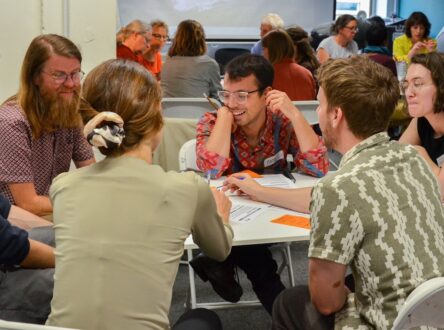Last weekend Coops UK hosted Coops Congress in Birmingham. I was delighted to be invited to speak on the panel Co-operatives at the heart of communities – solutions, challenges and where’s the support? alongside:
- Sara Barlow, Secretary, Voice of the Postmasters;
- Christxpher Oliver, Policy and Research Officer – Community Wealth Building, The Ubele Initiative;
- and Isla McCulloch, Community Shares Standards Work, Co-operatives UK

But beyond speaking on a panel, I had a fantastic experience connecting with old and new cooperators and I felt inspired by lots of interesting conversations. Here’s what I took away from the weekend:
- If (/when?) Labour wins the election, the Secretary of State for Business and Trade will be from the Labour and Co-operative Party. It’s in their manifesto to double the size of the co-operative economy. Sounds good to us, we hope to see more investment in cooperative development. It’s something we’re really serious about at Outlandish – we’ve delivered a range of cooperative development work for Islington Council through SPACE4.
- But the million dollar question is – how do we get people to start or convert into coops? Speaking from experience, entrepreneurialism and profit-centric business ethics makes it hard to promote the cooperative model. So while there’s lots of workshops about ‘which co-op model is right for you’ I think we need to take a step back and do more culture work around the value of collaboration and cooperation (before we even start to talk about cooperative legal structures). We need to be thinking about a pathway to becoming a cooperative – could there be a ‘democratic business’ category on that journey? That might be a more manageable proposition to an SME whose business owners are flirting with alternative business models.
- The billion dollar question is – how do we make sure there’s enough money in the cooperative economy? Luckily for you, we’ve been working on the answers. We’re all about Community Wealth Building and Progressive Procurement. We really want to see more councils and anchor institutions procuring their goods from local democratic businesses and cooperatives. We want to see more innovation in procurement policy and we’ve been working with our local authority, Islington, on this very subject. That’s what we aimed to to do in our first instalment of Cooperate Islington. Moreover, we want to see cooperatives providing innovative goods and services that people need and want to buy. We don’t want organisations to buy from co-ops only because that ticks some kind of ethical box, but because it makes business sense to buy from them.
- We need to help each other to COOPERATE – believe it or not. We’re in an economic crisis. Forget coops, even mainstream businesses are struggling. We need to remember that we’re stronger together and harness our collective intelligence to make sure we all get through this rough patch. I was reminded that we haven’t had a Co-Tech gathering in years. We’re working on that now…
- There’s more business-level interest in the cooperative movement. I’ve observed that more and more academics from business departments are interested in how coops do participation and democracy in the workplace. It feels like coops are on the cusp of entering the mainstream (maybe a new Labour and Cooperative Party Business Secretary will cement the deal). At Outlandish we’ve spent years developing tools and systems for the cooperative ways in which we work. We hope we can share these with wider business world when its ready.





